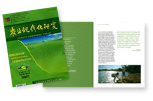- You are here: Home > Research > Research Progress
Melatonin and its metabolic product exhibit a strongly antioxidant potential. Various studies have confirmed that melatonin exerts regulatory effects on glucose metabolism, immune function and lipid metabolism.
Studies indicated that gut microbiota between obese and lean subjects showed significant difference, melatonin can improve the richness and diversity of gut microbiota. While, no evidence has validated that gut microbiota mediates the anti-obese effect of melatonin.
Researchers in the Institute of Subtropical Agriculture (ISA) of the Chinese Academy of Sciences conducted a series of experiment to explore the underlying mechanism of gut microbiota and SCFAs in the anti-obese effect of melatonin in HF diet-fed mice.
In their studies, ICR female mice were treated by melatonin, melatonin supplementation for antibiotic, gut microbiota transplantation and Sodium acetate.
The researchers found that melatonin improves lipid metabolism and reverses gut microbiota compositions, especially for the relative abundances of Firmicutes to Bacteroidetes at the phylum level.
Gut microbiota participates in the melatonin benefits on lipid dysmetabolism induced by HF diet. HF diet and sodium acetate treatment exhibits a similar anti-obese effect.
"Our findings suggest that the effect of melatonin on lipid metabolism is subsequent to its effect on gut microbiota and acetate acid production” said YIN Jie, a researcher in ISA.
The study entitled “Melatonin reprogramming of gut microbiota improves lipid dysmetabolism in high fat diet-fed mice" was published in Journal of Pineal Research.Details can be found at https://onlinelibrary.wiley.com/doi/10.1111/jpi.12524
It was supported by the National Key Research and Development Program of China, Key Programs of frontier scientific research of the Chinese Academy of Sciences, Hunan Key Research Program, National Natural Science Foundation of China, and Hunan Natural Science Foundation.
Contact: WU Xin
E-mail: wuxin@isa.ac.cn
Institute of Subtropical Agriculture, Chinese Academy of Sciences
Address: Mapoling of Changsha City, Hunan province, P.R.China.Tel: +86-731-4615204 Fax: +86-731-4612685

